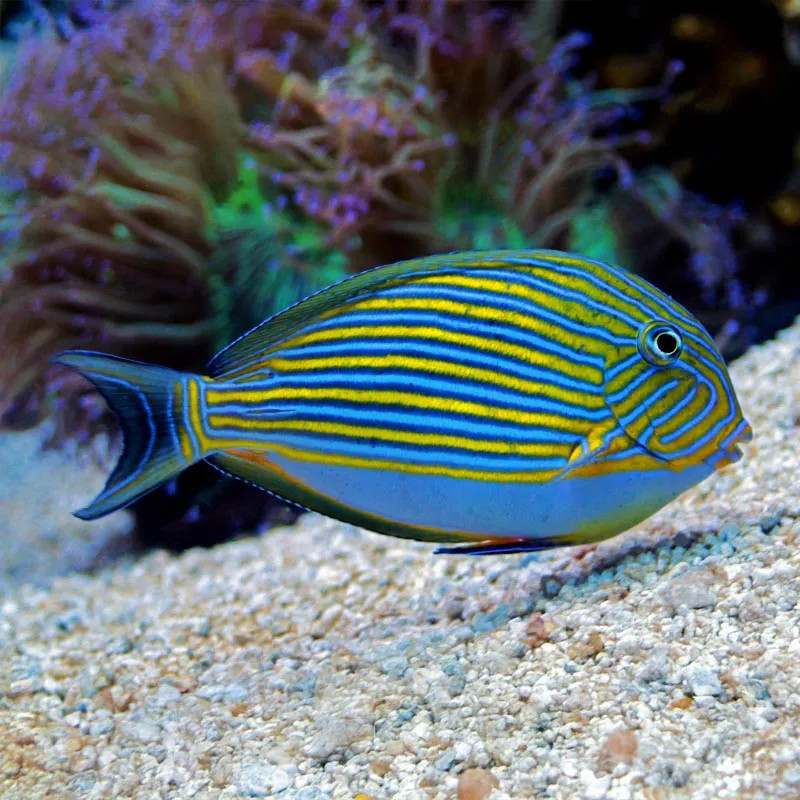Stocks Available
CHOCOLATE SURGEONFISH M
SKU:226151
Acanthurus pyroferus
2-2.75 INCH

Stock Available
Introduction: • Common Name: Clown Tang • Native Habitat: Inhabits the reefs and lagoons of the Indo-Pacific region, particularly around areas with abundant coral and rock formations. Physical Characteristics: • Appearance: The Clown Tang has a vibrant body characterized by a striking blue background with bright yellow and orange stripes running vertically. Its body shape is oval, with a distinctive sharp spine at the base of the tail, which gives the species its common name. • Size: Typically grows up to 8 inches (20 cm) in length. • Fins: The dorsal fin is long and pronounced, contributing to its graceful swimming style. Habitat Requirements: • Tank Size: A minimum tank size of 100 gallons is recommended to provide ample swimming space and to accommodate its active nature. • Water Conditions: • Temperature: Ideal water temperature ranges from 74°F to 78°F (23°C to 26°C). • pH Level: Maintain a pH of 8.1 to 8.4 to replicate natural conditions. • Salinity: Aim for a salinity of 1.020 to 1.025. • Aquascaping: Provide plenty of hiding spots with live rock, caves, and swimming areas to mimic their natural environment and reduce stress. Diet: • Feeding Habits: Clown Tangs are primarily herbivorous, feeding on algae and plant matter in the wild. • Dietary Options: They thrive on a varied diet that includes high-quality marine algae, spirulina, and specially formulated herbivore pellets. Fresh vegetables like spinach and romaine lettuce can also be offered. • Feeding Frequency: Feed them small amounts multiple times a day to ensure they receive adequate nutrition and to prevent overfeeding. Compatibility: • Temperament: Generally, Clown Tangs are semi-aggressive, especially when establishing territory. • Tank Mates: Suitable tank mates include larger, robust fish like tangs, angels, and wrasses. • Incompatibilities: Avoid keeping them with smaller or more timid species, as well as other tangs, which may lead to territorial disputes. Care Level: • Difficulty: Moderate; while resilient, Clown Tangs require stable water conditions and a proper diet to thrive. • Health Monitoring: Regular water quality checks and monitoring for signs of disease are essential for maintaining their health. Breeding: • Breeding Behavior: Breeding in captivity has not been successfully documented; they are known to form strong pairs in the wild during spawning season. • Fry Care: If breeding occurs, specialized care would be necessary for the fry, including suitable feeding options. Economic Considerations: • Market Demand: Clown Tangs are popular among marine aquarium enthusiasts due to their striking appearance and active behavior. • Pricing: Prices can vary based on size and availability, typically falling within the moderate range. Sustainability and Conservation: • Wild Population: Generally stable, but concerns include habitat degradation and overfishing in some regions. • Aquaculture: Some success in captive breeding, but many specimens are still sourced from the wild. Conclusion: The Clown Tang is a visually stunning addition to marine aquariums, known for its vibrant colors and lively disposition. With appropriate care, a well-maintained tank, and suitable companions, these fish can thrive, providing beauty and activity to underwater environments.
Data sheet
16 other products in the same category:
Customers who bought this product also bought: